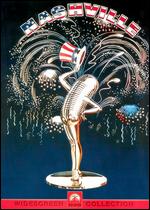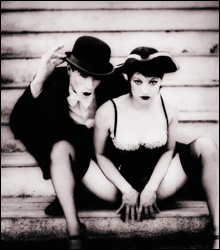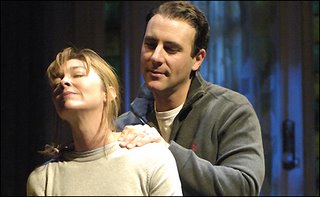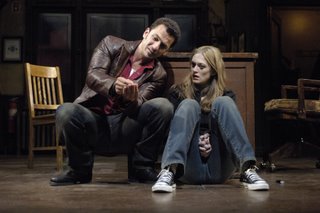
I haven't always been a fan of Robert Altman, who passed away today at the age of 81. In fact, I have to admit I'd say he hadn't directed a great - or even particularly interesting - movie in a quarter century (
The Player,
Short Cuts, and
Gosford Park are all hopelessly overrated, often by young critics longing for a return to both his heyday and that of their mentor, Pauline Kael). But for a brief period, in the early 70s, his career burned with an unmatched brilliance, and those films (
Images,
Thieves Like Us,
The Long Goodbye, and particularly
Nashville) will remain his true legacy. Why, for a while, did he work with a genius that he would never again rekindle? This is a question for a far longer essay - one that would ask the same question of Francis Ford Coppola, Martin Scorsese, Steven Spielberg, and many others. But in the meantime, I thought I would reprint an appreciation I wrote several years ago upon the DVD release of Altman's masterpiece,
Nashville.
 Nashville
Nashville Now
by Thomas Garvey
Perhaps the greatest scandal of the much-ballyhooed AFI Top 100 was that Robert Altman's
Nashville was nowhere on it. Most thoughtful people would plunk it in the top 10 (there's plenty of room -
Schindler's List could certainly go); but the real shock was
Nashville didn't make the list AT ALL - of the entire Altman oeuvre, only the inferior
M*A*S*H made the cut, despite the fact Altman's still a working force in Hollywood, and Paul Thomas Anderson has virtually made a career of recycling his moves.
Ah, well,
Nashville always foundered with the masses. It appeared in 1975 along with an array of other brilliant films - the competing nominees for Best Picture that year were
Barry Lyndon,
Dog Day Afternoon,
Jaws, and
One Flew Over the Cuckoo's Nest. (Had there been a year like that since 1939?) Of course arguably the weakest movie (
Cuckoo) won, because it was neither too commercial (
Jaws) nor too artistic (
Nashville and
Lyndon) - after all, the Academy likes its porridge "just right".
So
Nashville joined the hallowed ranks of best pictures derailed by other best pictures -
Cabaret,
Chinatown, et. al. But unlike those movies (including even
Lyndon!) it somehow sank from sight. Part of the problem was that it was a gigantic bomb (Pauline Kael famously predicted it was going to be "huge"!). Then Altman sank, too, producing turkey after turkey, each gobbling louder than the last: first
Buffalo Bill and the Indians, then
Three Women, then
A Wedding,
Quintet,
H.E.A.L.T.H. . . . he seemed to be digging his way to China. After five disasters in a row, even the mild commercial success of
Popeye couldn't turn things around, and he was soon directing TV movies and stage-to-screen fare like
Streamers. Slowly but surely, though, over the last decade, he's been working his way back to viability - and visibility.
To my mind, however, he's still pretty deep in the hole. His first "hit" of the 90s,
The Player, was wildly over-praised, though it did include the classic scene of the Hollywood exec literally killing his screenwriter. Then came
Short Cuts, which misrepresented Raymond Carver, but at least featured Julianne Moore trying to steal a scene back from her own muff (stripping actresses bare is something of an Altman motif) - all the while, of course, reminding people of
Nashville. Reminding people of
Nashville did the same trick for Paul Thomas Anderson, who turned said trick not once but twice (
Boogie Nights AND
Magnolia). And now, here's
Nashville itself, all over again, re-issued in a commemorative DVD edition.
Well, whatever else Robert Altman may have done in the last twenty-five years,
Nashville still stands as a movie like no other. With its sprawling stories and umpteen characters crawling all over each other in our corny country capital, the movie defies every rule of narrative. It's completely allusive, completely atmospheric; it's a kind of naturalistic pointilism. Every second has to be compelling, because there's no suspense whatsoever: we're never really looking forward to anything - we're just struck by the dead-on accuracy of what Altman's giving us here-and-now. We realize the movie is building to a campaign rally, to be staged at Nashville's "Parthenon" for a Eugene-McCarthy-like presidential candidate - but we're not exactly on the edge of our seats about it, and nobody in the movie is, either - they seem to know themselves that it's just a handy frame for their own sprawling canvas.
But who, we have to wonder, is the painter? A quarter of a century after the film's release, Joan Tewkesbury, its writer, looks more and more like the "auteur" of
Nashville - if there is one. Altman's sets were famously collaborative, and many of the lines we hear aren't Tewkesbury's - they're either remodeled by the actors or freshly improvised. But actors can't improvise the structure of their scenes, or how they fit together - and Tewkesbury has done an incredible job of structuring "Nashville". Although its overall arc isn't exactly a "story", each of its tiny dramas is about as tight as it can be. And the tapestry they're woven into is rarely dull - it's just entirely thematic, like a college girl's journal - in fact,
Nashville comes closer than any other movie to distilling the distinctive, disaffected voice of the smart, gimlet-eyed young thing into something like an epic.
But what, as Roger Ebert has wondered aloud, "is it really about?". Well, like very few American movies, it's about politics; the first shots are of loudspeakers on the "Replacement Party" van, telling Nashville - and us - that we CAN do something about our country's plight, that like it or not, we are per force involved. Next comes Henry Gibson fervently singing "We must've been doing something right, these last two hundred years" (only in a voice that rings more with control than freedom).
We soon realize that indeed, this is one hell of a reactionary town - even the majorettes twirl rifles! But then the movie's Democrats don't come off much better than its Republicans; "Opal from the BBC" (Geraldine Chaplin) has drifted in from
Yellow Submarine, and babbles on about liberal totems in a way that's fatuously self-dramatizing. And the Eugene McCarthy stand-in, "Hal Philip Walker", spouts enlightenment and eccentricity in almost equal measure, with a campaign slogan - "Does Christmas smell like oranges to you?" - that exquisitely skewers the counterculture.
Not that the good folk of Nashville are paying much mind. For them, and their stars, politics (even conservatism) doesn't really exist. (Tewkesbury predicted this alienation long before anybody else.) What they have instead is country music, which with its simple chord changes and repetitive rhythms, sticks to either good times or tragedy - it's all personal, not political, and its stars learn not to create their own persona so much as mind-meld with their audience's. They're like outgrowths of the crowd, re-feeding it what it long ago digested. At the Grand Ole Opry, the stars' friends are on stage with them, and more friends are in the audience - and the whole thing is being broadcast to an even larger audience of friends - it's like one of those Russian dolls-within-dolls that recurse down to nothing. Who - or what - is performing for whom?
But the pain within this hall of mirrors is still devastatingly real. With its forced peppiness amid squalor, the country mentality is at bottom disassociated - and the result is an undercurrent of floating, impotent lament. The saintly star of Nashville, "Barbara Jean" (Ronee Blakeley) personifies this - except that she isn't really a person, she's more like a puppet. When she tries to reminisce, she collapses into incoherence; yet when she opens her mouth to sing, she channels a wail of real torment. She's in the midst of yet another nervous breakdown, and even has her own guardian angel, in the person of a soldier (a very young Scott Glenn) who keeps watch outside her hospital room. But we know his cause is hopeless.
Nashville is, in part, the story of her crack-up - and how the American lust for violence, crossing paths for once not with politics but its replacement, takes her as its next victim.
But in the meantime the town's various schemers and dreamers have their own show to do. Tewkesbury opens the film by piling them all into a traffic jam - the perfect metaphor for the movie, busy yet static - and then does a beautiful job of following the different threads that spin off from this honking knot. There's Gibson and his bitchy sex mama, Barbara Baxley; spooked wife-on-the-run Barbara Harris; tin-eared wannabe Gwen Welles; smooth operator Keith Carradine; gospel singer Lily Tomlin; mourning husband Keenan Wynn, his wandering niece, Shelley Duvall; and of course, Michael Murphy and Ned Beatty, the political operatives for Hal Philip Walker, who pull all these characters into either the performance or the crowd at the Parthenon.
There's one more wild card, the "twin" of Scott Glenn's soldier - a gawky kid with something mysterious in a fiddle case - something we guess is probably a gun. With his nervous sensitivity and jumpy reactions, he's a new Holden Caulfield - the flip side of American adolescence, the innocent voice of assassination, who perhaps has already targeted Hal Phillip Walker.
Tewkesbury deploys many a hidden structure to keep this wild tangle straight. Loose "families" of characters develop, often clustered around an audition, or a party, or just a bar, interacting not so much to push the "plot" forward as to shade, enhance, or undercut each others' stories. Thus Tewkesbury seats her soldier and her assassin right next to each other at the Grand Ole Opry: each one's existence confirms the other's. (Perhaps the would-be assassin keeps his pistol in a fiddle case because it's his instrument, his ticket to stardom.) Other groupings conceal similar parallels within seeming opposites: Tomlin, who is most in touch (of the movie's whites) with musical ecstasy, has children who are congenitally deaf - although she - and we - can tell they're the happiest people in the picture, with no barrier whatsoever, it seems, between them and music. (What other musical, by the way, includes deaf characters?)
But perhaps Tewkesbury's most audacious gambit occurs when Keith Carradine takes the stage to sing "I'm Easy". In his audience are not only his conquests of the weekend (one of whom left "I love you" scrawled on his mirror) - but also his current targets of seduction, Shelley Duvall and Lily Tomlin. He's the personification of allure - everyone wants to either be a singer or bed one, and he's become as mechanized as the star-maker machinery he works with. The song itself is a masterpiece of hypocrisy: "I'm not much good at playing games, and this one's driving me insane . . ." In his eyes,
he's the innocent,
he's the victim. Of course, at least some people in the audience know better: the female singer in his trio (the one who wrote "I love you"), was about to leave her husband for him - but suddenly sees right through him. Likewise Tomlin, seated in the back of the club, isn't foolish enough to believe in either the singer or the song. But the old romantic lie still tugs at her, and her face, knowing better but still slowly letting go, has just about become iconic.
Much has rightly been made of the film's unusual concern with musical performance in and of itself - what it is, and what it means. Perhaps the most beautiful moment in the film occurs when Tomlin's deaf little boy sings silently in church; he's purely "into" the music, or perhaps something even beyond music - it's just him and God. With everyone else, the motives (and the outcome) are a bit more muddled, though we're often struck by the nobility that even the most naïve of these singers can achieve. Of course the fun is sometimes in how banal the music is - at least until it begins to wail. But we slowly realize that the tunes are not actually as calculated as they seem; or at least, they're only as calculated as the lies we tell ourselves.
For this is the essence of both the town and the film -
Nashville is exactly what it says it is. When Gibson sings, in a tone of hilarious sanctity, that he must break off an affair "for the sake of the children", we never expect that this is exactly what we'll see of Lily Tomlin, who seems to be one of the few hip people in town. Gwen Welles, who ends up having to strip for her chance to sing at the Parthenon, has written her own song, "I'll Never Get Enough" - and indeed, even after her abject humiliation, she still comes back for more. The whole gambit of having the stars write their own songs is interesting on the conceptual level - it's a quiet, subtle comment on how everyone "gives away" their inner life in the disguise of performance.
Which leads to
Nashville's ultimate theme: disillusionment (Altman's great theme, actually, and probably the great theme of the 70s). Every story in this movie ends either sadly or ironically. There's no happy ending for anybody. Life is cruel, Altman and Tewkesbury say, and if you hope for things, you're just setting yourself up. Tomlin realizes her affair is simply impossible, and leaves her lover just before he describes her as "room service". After stripping naked for a chance in the limelight, Welles watches her big moment turn into political murder. Ronee Blakely finally gets it all together, and sings her best - only to be literally shot down - which leaves Scott Glenn, who has spent the weekend protecting her, simply staring into space. Of course all these disappointments are subsumed by the disappointment of the rally - and of the country itself: the Kennedys were shot, liberalism failed, and all we've got left is a clueless, blindly happy conservativism. So just get over it.
It's a cruel vision, perhaps cruelest in its intimation that it's all our own fault. Throughout the movie we can hear Hal Philip Walker's van in the background, like the rational voice of God, asking us insistently about justice, and fairness, and right and wrong. But nobody listens - in fact, all the performers make it clear they're doing the rally for non-political reasons, just for the sake of their careers. When Henry Gibson is wounded, we're struck by his cry - "This isn't Dallas, it's Nashville!", and even as he tends to Barbara Jean, he rallies the crowd to sing: "Go on, sing! Keep singing!" Only singing is part of the problem. He hands the mike to the barely-coherent Barbara Harris - she's been trying to "become a singer" through the whole movie - and she knows this is her big chance. But what does she sing? "You may say/that I ain't free/but it don't worry me!" she cries - and we realize we've been hearing this (by Keith Carradine) in one form or other throughout the whole movie - this is the real American anthem - You may say that I ain't free, but it don't worry me! We're not about to do anything about our freedom, and don't try to make us. If the reformers are stars, like the Kennedys, then we'll shoot them down - and if they're NOT stars, like Hal Phillip Walker (who escapes in a limo), we'll just shoot the stars themselves - thus making ourselves a star, if only for a day. We're never given a reason for the assassination; the young killer simply looks up at the huge American flag rippling across the Parthenon - and opens his fiddle case.
So
Nashville ends darkly, like so many of the movies of its time - but this doesn't necessarily mean it's dated. Instead it feels more like a relic of a lost age of exploration - today we touch it the way someone in the dark ages might have looked at the Pantheon, wondering, how the
hell did they do that?
Of course to give all the credit to Tewkesbury is unfair to Altman, but it's important to sort out exactly what's what about
Nashville. Tewkesbury's script, we realize in retrospect, is probably the kind of project best-suited to Altman's techniques - his ensemble scenes, his composite soundtracks, his inherent ramblingness. Here the script always works with him, not against him - it's a semi-documentary, it's essentially literary, not visual, and it hides within its shagginess a series of tightly-written vignettes. Altman never found a script like this again - and he's been foundering ever since.
One last thought - the success of
Nashville depends, perhaps more than any other movie, on its soundtrack. Unlike most other great directors, Altman never goes for synthesis - that operatic moment when sight and sound come together overpoweringly, like the last moments of
2001. Instead he lets his images and his sounds drift loosely together, usually making points on their own.
Nashville, appropriately enough, deserves more than one hearing , rather than more than one seeing. The sound can be a bit muddy, but is still a marvel - conversations float above and below each other, pertinent bits of background noise pop through at just the right time, and we sense whole metaphors forming aurally. Sound as the source of cinematic expression may have never gotten such a workout - and one can only hope, with today's advanced audio systems, that Altman someday finds another writer like Tewkesbury - and another script like
Nashville.







